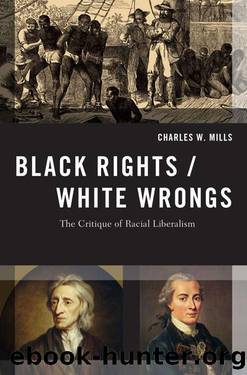Black RightsWhite Wrongs (Transgressing Boundaries: Studies in Black Politics and Black Communities) by Charles W. Mills

Author:Charles W. Mills [Mills, Charles W.]
Language: eng
Format: epub
Publisher: Oxford University Press
Published: 2017-02-28T18:30:00+00:00
Collected Papers
In 1999, Samuel Freeman edited a collection of twenty-six of Rawlsâs published papers, spanning almost half a century (1951 to 1997) and including a 1998 interview of Rawls with the magazine Commonweal. According to Freemanâs preface (ixâx), the collection is almost comprehensive, the excluded essays being variously earlier versions of more polished articles, minor occasional pieces, or essays later incorporated into the paperback edition of Political Liberalism.
Rawlsâs first published paper, in 1951, characterizes âideologiesâ negatively as claiming âa monopoly of the knowledge of truth and justice for some particular race, or social class, or institutional group, and competence is defined in terms of racial and/or sociological characteristicsâ (5). Appearing only a few years after the end of World War II, with the defeat of the Third Reich still a powerfully overshadowing memory in the West, this comment is pretty clearly a reference to National Socialism. A 1969 essay, âThe Justification of Civil Disobedience,â discusses civil disobedience in the context of oppressed âminorities,â though race is not mentioned. Apart from the implicit and brief 1951 Nazi reference, then, race does not appear in any of the essays leading up to the 1971 publication of Theory. Subsequent to its publication there are a few appearances of the topic, or at least the term. A 1975 essay lists âsex and raceâ among the data about themselves to which parties behind the veil should not have access (268) and cites as examples of unjust conceptions of the good those âthat require the repression or degradation of certain groups on, say, racial or ethnic ⦠groundsâ (280). A 1988 essay says it is permissible for âa constitutional regimeâ to discourage âvarious kinds of religious and racial discrimination (in ways consistent with liberty of conscience and freedom of speech)â (461) and repeats that any conceptions of the good requiring racial repression, âfor example, slavery in ancient Athens or in the antebellum South,â are ruled out (462). There is a footnote in a 1989 essay to another authorâs discussion of the Dred Scott and Brown decisions (496n51). Finally, the last essay (1997), âThe Idea of Public Reason Revisited,â which also appears in The Law of Peoples, has some brief discussion in connection with âpublic reasonâ of the abolitionists, Martin Luther King Jr., and the civil rights movement (593, 610), as well as the Lincoln-Douglas debates (609â10). As before, race is cited on a list of the factors giving rise to âthree main kinds of conflictsâ (612). That is all that I can find in the collectionâs 600+ pages.
Download
This site does not store any files on its server. We only index and link to content provided by other sites. Please contact the content providers to delete copyright contents if any and email us, we'll remove relevant links or contents immediately.
| General | Discrimination & Racism |
Nudge - Improving Decisions about Health, Wealth, and Happiness by Thaler Sunstein(7693)
The Fire Next Time by James Baldwin(5431)
iGen by Jean M. Twenge(5408)
Adulting by Kelly Williams Brown(4566)
The Sports Rules Book by Human Kinetics(4379)
The Hacking of the American Mind by Robert H. Lustig(4375)
The Ethical Slut by Janet W. Hardy(4242)
Captivate by Vanessa Van Edwards(3838)
Mummy Knew by Lisa James(3686)
In a Sunburned Country by Bill Bryson(3537)
The Worm at the Core by Sheldon Solomon(3486)
Ants Among Elephants by Sujatha Gidla(3461)
The 48 laws of power by Robert Greene & Joost Elffers(3249)
Suicide: A Study in Sociology by Emile Durkheim(3018)
The Slow Fix: Solve Problems, Work Smarter, and Live Better In a World Addicted to Speed by Carl Honore(3007)
The Tipping Point by Malcolm Gladwell(2914)
Humans of New York by Brandon Stanton(2868)
Handbook of Forensic Sociology and Psychology by Stephen J. Morewitz & Mark L. Goldstein(2704)
The Happy Hooker by Xaviera Hollander(2686)
